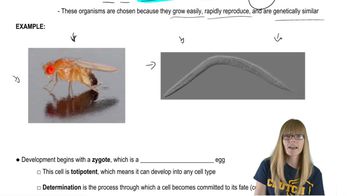Here are the essential concepts you must grasp in order to answer the question correctly.
Genome-Wide Association Studies (GWAS)
GWAS are research methods used to identify genetic variants associated with specific diseases by scanning the genomes of many individuals. They compare the DNA of individuals with a particular disorder to those without, looking for common genetic markers. This approach helps pinpoint genes that may contribute to the risk of developing certain conditions.
Recommended video:
Single Nucleotide Polymorphisms (SNPs)
SNPs are the most common type of genetic variation among people, where a single nucleotide in the genome differs between individuals. In GWAS, researchers often focus on SNPs to find associations with diseases, as these variations can influence gene function and contribute to the development of genetic disorders.
Recommended video:
Recombination after Single Strand Breaks
Statistical Significance in Genetic Studies
Statistical significance is crucial in GWAS to determine whether the observed associations between genetic variants and diseases are likely due to chance. Researchers use p-values and other statistical measures to assess the strength of these associations, ensuring that the findings are reliable and can be replicated in independent studies.
Recommended video:





